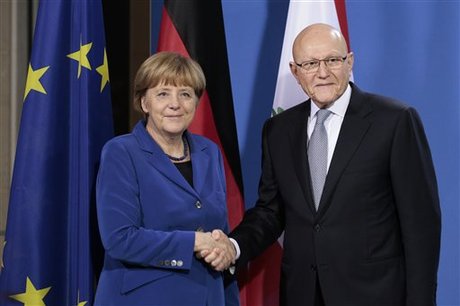U.S. Extends National Emergency with Respect to Lebanon
Naharnet /30 July/15/U.S. President Barack Obama has extended the national emergency with respect to Lebanon that was declared in Executive Order 13441 of August 1, 2007.He said in a statement released by the White House on Wednesday that “the national emergency is to continue in effect beyond August 1, 2015.”Referring to Hizbullah’s arms, the statement read: “Certain ongoing activities, such as continuing arms transfers to Hizbullah that include increasingly sophisticated weapons systems, undermine Lebanese sovereignty, contribute to political and economic instability in the region, and continue to constitute an unusual and extraordinary threat to the national security and foreign policy of the United States. “For this reason, I have determined that it is necessary to continue the national emergency declared in Executive Order 13441 with respect to Lebanon.”
Sources: Iran Not Ready to Resolve Baabda Crisis despite French Pressure
Naharnet /30 July/15/French Foreign Minister Laurent Fabius has urged his Iranian counterpart Mohammad Javad Zarif to exert efforts to end Lebanon’s presidential crisis, informed sources said.The Iranian sources told pan-Arab daily al-Hayat published on Thursday that Fabius told Zarif about the importance of contacting Lebanese parties that are allied with Iran to urge them to find a solution to the deadlock.But according to the sources, Zarif said it was not up to the Iranian foreign ministry to interfere in the issue, urging Fabius to discuss the matter with President Hassan Rouhani. When the French official brought up the issue during his talks with Rouhani, the Iranian leader distanced himself from the matter, bringing up subjects such as the nuclear deal signed between Tehran and world powers earlier this month, the sources told al-Hayat. The Iranian officials hinted to Fabius that Tehran is not yet ready to use its influence in the region to interfere in Lebanon’s presidential crisis as long as the nuclear deal is still in its implementation stage, the newspaper quoted French sources as saying. Baabda Palace has been vacant since President Michel Suleiman’s six-year tenure ended in May last year. France sought Wednesday to relaunch diplomatic ties with Iran in the hope of boosting business in the country, following the key nuclear deal.
Fabius called his one-day visit to Iran “an important trip” and tried to soften tensions created by France’s hard line on the nuclear issue. The July 14 deal between Iran and six world powers — the U.S., Britain, France, Russia, China and Germany — is meant to curb Tehran’s nuclear program in exchange for lifting sanctions.
Salam Blames Political Conflict for Waste Deadlock
Naharnet/30 July/15/The government failed on Thursday to agree on measures to manage the country’s waste crisis, which Prime Minister Tammam Salam blamed on the political conflict as he issued a veiled warning that he could resort to resignation if the deadlock on several issues continued.Information Minister Ramzi Jreij said following the session that was chaired by Salam at the Grand Serail that the PM described the country’s environmental situation as a “disaster.”Jreij said Salam told the cabinet that “the crisis erupted because over the years, there had only been temporary solutions.”The premier urged all sides to put aside the political conflict and work for the benefit of the country, said the information minister. He also urged all parties “to work with devotion to find a solution to the garbage crisis.” Salam lamented that the political conflict was stopping a ministerial committee from tackling the issue although it is “exerting strong efforts” to resolve the waste crisis. “If we don’t find serious solutions to guarantee the continuation of the work of the cabinet in the absence of the president, then we will hit a dead-end,” the PM warned. Salam also told the cabinet that he had “several options (on the table) and could resort to any of them if the deadlock continued,” said Jreij, in reference to a possible resignation.
No date was set for another session, a sign that any solution to the waste crisis or to the government’s decision-making mechanism was not looming on the horizon. The committee that is chaired by Salam found earlier this week a temporary solution to begin taking trash to several landfills in undisclosed locations. But its decision was met with severe criticism and protests by residents and local officials who refused the waste of Beirut and Mount Lebanon to be dumped in their areas. The garbage crisis, which erupted after the closure of the Naameh landfill on July 17, came amid a gridlock in the cabinet over its decision-making mechanism. The Free Patriotic Movement has stressed that its ministers should have the right to coordinate with Salam on setting the cabinet’s agenda because they consider themselves as representatives of the president in his absence. Their conditions intensified the tension between the different parties.
No Plan for Salam to Resign despite Growing Crises
Naharnet /30 July/15/Prime Minister Tammam Salam has stressed that he will not resign despite growing political and environmental crises that are threatening to spiral out of control. According to the Kuwaiti al-Anbaa daily published on Thursday, Salam told religious officials and diplomats that the country’s political situation is grave but that he would not announce his resignation. His decision might have come as a result of pressure exerted by top diplomats, mainly the Saudi Ambassador, not to take any resignation decision over fears that the country’s crises would worsen. Saudi Ambassador to Lebanon Ali Awadh Asiri said following talks with Salam on Tuesday that “the Kingdom is keen on the continued functioning of state institutions, chiefly the premiership.” Al-Anbaa said that Asiri traveled to Riyadh on Wednesday to brief the Saudi leadership on Lebanon’s political situation. On Wednesday, Salam headed the fourth meeting that the ministerial waste management committee has held since Monday. But the conferees failed to reach any solution to the garbage crisis that erupted after the closure of the Naameh landfill on July 17. The landfill, which opened in 1997, in the town of Naameh south of Beirut, was meant to receive trash from the capital and the heavily-populated Mount Lebanon area for only a few years until a comprehensive solution was devised. But that plan never came to fruition, as efforts to pass waste legislation withered in Lebanon’s notoriously fractured and stagnant parliament. After the landfill’s closure, streets overflew with waste and the air filled with the smell of rotting garbage. The committee found a temporary solution to begin taking trash to several landfills in undisclosed locations. But its decision was met with severe criticism and protests by residents and local officials who refused the waste of Beirut and Mount Lebanon to be dumped in their areas. The garbage crisis came amid a gridlock in the cabinet over its decision-making mechanism. The Free Patriotic Movement has stressed that its ministers should have the right to coordinate with Salam on setting the cabinet’s agenda because they consider themselves as representatives of the president in his absence. Their conditions intensified the tension between the different parties.





















